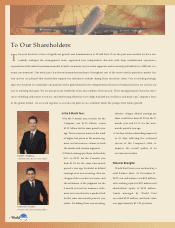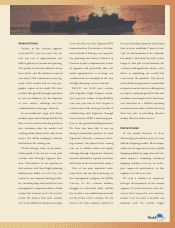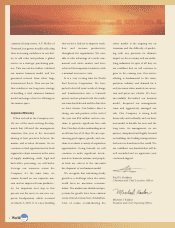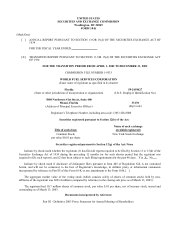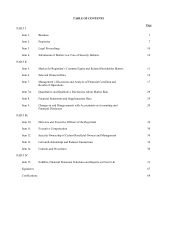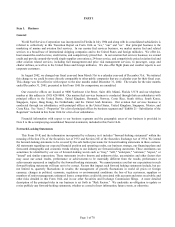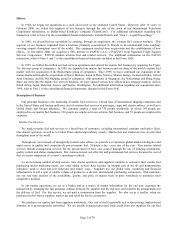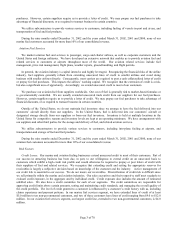World Fuel Services 2002 Annual Report Download - page 14
Download and view the complete annual report
Please find page 14 of the 2002 World Fuel Services annual report below. You can navigate through the pages in the report by either clicking on the pages listed below, or by using the keyword search tool below to find specific information within the annual report. The National Pollutant Discharge Elimination System (“NPDES”), a program promulgated under the Clean Water Act,
permits states to issue permits for the discharge of pollutants into the waters of the United States in lieu of federal EPA
regulation. State programs must be consistent with minimum United States federal requirements, although they may be more
stringent. NPDES permits are required for, among other things, certain industrial discharges of storm water.
The Oil Pollution Act of 1990 imposes liability for oil discharges, or threats of discharge, into the navigable waters of the
United States on the owner or operator of the responsible vessel or facility. Oil is defined to include oil refuse and oil mixed
with wastes other than dredged spoil, but does not include oil designated as a hazardous substance under CERCLA. The act
requires the responsible party to pay all removal costs, including the costs to prevent, minimize or mitigate oil pollution in
any case in which there is a discharge or a substantial threat of an actual discharge of oil. In addition, the responsible party
may be held liable for damages for injury to natural resources, loss of use of natural resources and loss of revenues from the
use of such resources.
State and Local Government Regulations. Many states have been authorized by the EPA to enforce regulations
promulgated under RCRA and other United States federal programs. In addition, there are numerous state and local
authorities that regulate the environment, some of which impose stricter environmental standards than United States federal
laws and regulations. Some states, including Florida, have enacted legislation which generally provides for registration,
record keeping, permitting, inspection, and reporting requirements for transporters, collectors and recyclers of hazardous
waste and waste oil. The penalties for violations of state law include injunctive relief, recovery of damages for injury to air,
water or property and fines for non-compliance. In addition, some local governments have established local pollution
control programs, which include environmental permitting, monitoring and surveillance, data collection and local
environmental studies.
Non U.S. Government Regulations. Many non-U.S. governments impose laws and regulations relating to the protection
of the environment and the discharge of pollutants in the environment. Such laws and regulations could impose significant
liability on us for damages, clean-up costs and penalties for discharges of pollutants in the environment, as well as injunctive
relief. In addition, some non-U.S. government agencies have established pollution control programs, which include
environmental permitting, monitoring and surveillance, data collection and environmental impact assessments.
U.S. Federal, State, and Non-U.S. Taxes on Fuel. Our marine and aviation fueling operations are affected by various
U.S. federal and state taxes imposed on the purchase and sale of marine and aviation fuel products. In the United States,
federal law imposes a manufacturer’s excise tax on sales of marine and aviation fuel. Sales to aircraft and vessels engaged in
non-U.S. trade are exempt from this tax. These exemptions may be realized either through tax-free or tax-reduced sales, if
the seller qualifies as a producer under applicable regulations, or, if the seller does not so qualify, through a tax-paid sale
followed by a refund to the exempt user. Several states, where we sell marine and aviation fuel, impose excise and sales
taxes on fuel sales; certain sales of fuel by us qualify for full or partial exemptions from these state taxes. Non-U.S.
jurisdictions also impose certain taxes on fuel, such as VAT and excise taxes. We continuously review our compliance with
U.S. and non-U.S. laws which impose taxes on our operations. Sales and excise taxes on fuel are generally added to the
sales price and passed on to our customers. However, in certain cases, we may be responsible for these taxes, including
cases where the customer fails to reimburse us, or where the customer or we do not qualify for an exemption believed to be
available at the time of the sale.
Page 6 of 70


